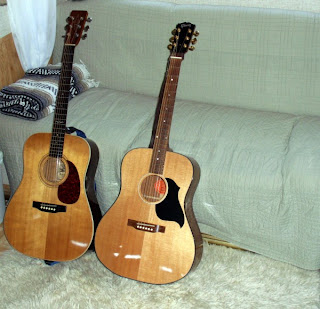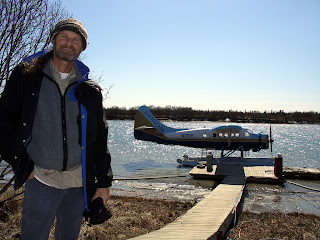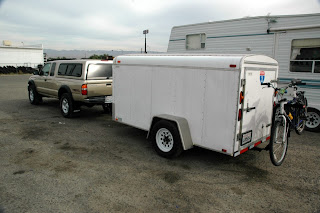20071025 Please, No More Stuff
For ten years now I have lived the nomadic park service lifestyle, not that I developed deep roots anywhere during the preceding 43 years of my life. Hence the title of this blog—Never Owned a Sofa. It’s true. This wandering began early. With my father’s work installing Cold War era missile silos for a defense contractor, our family moved frequently. I never completed a full academic year in just one school until the sixth grade.
So, the seasonal lifestyle, moving every few months, suits my itchy feet just fine. Problem is, how to accomplish the moves at minimum expense while keeping enough possessions to make life reasonably comfortable.
My first season I took to Sequoia what I could fit in my old Honda Accord equipped with a clamshell-type plastic rooftop carrier. You know the ones, you get them at Sears. They are gray on the bottom and white on the top, have a square footprint, and have a honey bee decal. Everything I owned that would not fit in the car and carrier was crammed into a 5’x10’ storage unit.
One summer at Sequoia NP was enough to tell me that I needed more stuff. The college dorm life may be fun when you are 19, but hey, that was a LONG time ago. At the end of that first season the Accord went to a good home, replaced by a used Toyota pickup with a camper shell. I enjoyed more creature comforts the second summer.
My first winter season at Everglades came after the second summer in Sequoia. On the cross-country journey my belongings totally filled the truck’s cargo area front to back, side to side, and top to bottom. Motels? You must be joking. Each evening I camped out beside the truck.
Generally the camping was fun. I cooked meals on the tailgate with a white gas Coleman stove I resurrected from a couple of dead ones Sequoia campers had pitched in dumpsters. For sleeping, I have a one-person bivy shelter with semi-circular hoops to create some space inside. It goes up in a heartbeat.
Now not all of the places I chose to camp were camping areas per se, because I would drive until I was tired then just find a dark place. Out-of-the-way freeway offramps were popular. Sometimes, though, I had to drive two or three hours beyond tired to get away from a city.
One late night I pushed eastbound through light rain to reach the east side of Dallas/Fort Worth (so as to avoid morning rush hour traffic coming into the city). The city seemed to go on and on and on. Finally, it must have been 1 or 2 in the morning, I came to an area with few lights so I pulled off and turned right. For a mile or two I drove south down what seemed to be a lonely highway, staring at the white lines like a drunk just to stay awake. Not finding anything like a turnout, I just pulled off onto the grassy shoulder. Out came the bivy shelter and instantly I slept.
What must have been just a few minutes later a radio-transmitted voice and a bright light awakened me. A car engine idled. I could here a crackly voice reciting my name and address. These must be the cops. Indeed they were.
The two gentlemen were exactly that, gentlemen (as well as cops, or deputy sheriffs to be precise). They courteously asked for identification without even asking me to exit the shelter into the rain. I explained the situation—that I was on my way to Florida, too tired to continue, and would be on my way at first light.
Not a problem. It seems that some neighbors had heard the truck stop, were concerned for my welfare, and asked that someone come to check. The officers did caution me that, one, the highway would be quite busy with commuters in the morning and, two, that I would be wishing I had not camped in the grass with the chiggers. They were right on both counts. Have you ever had chiggers? I had many, but that is a story for another day.
Right then I decided I must have either more space or less stuff so that I could sleep in the bed of the truck. That way I could sleep in cities and sleep whenever I was tired and sleep out of the elements when I wanted. Less stuff was out of the question. How could I do without my pair of Yamaha 3-way attenuated studio monitors (speakers) weighing in a 65# apiece? It had to be more space.
More space translated into a cargo trailer. I would be able to haul all of my stuff and sleep in the truck. What the heck, my truck already had the hitch and wiring that towing required.
After the third summer at Sequoia, with a little time in San Diego staying with my buddy Clay, I was able to accomplish a couple of things I would have trouble doing while living in parks. First, I got rid of most of what I had been storing for three years. If I hadn’t needed any of it for all this time, couldn’t I do without it? Using my sister’s house in an upper-middle-class neighborhood, I held a garage sale and gave some people some really good deals.
I also had time to shop for a trailer. One day the perfect trailer just popped out from the classified ads. A U-Haul type enclosed cargo trailer with a 5’x10’ box. Plenty of space! For the first journey east all of my belongings filled the trailer to but 1/3 capacity. I had the entire bed of the truck for a comfy bed.
.jpg)
You’ve heard the expression that work expands to fill the time allotted for it? Similarly, my possessions expanded to fill the space allotted, namely the trailer. Just as the truck before it, within two years or so the trailer was filled front to back, side to side, and top to bottom. Even after giving away my precious studio monitors a couple of years ago, the trailer is still full. And heavy!
.jpg)
At 53 my brain is full or seems to be. For every new factoid I must jettison one of the old. Well, not that I must, as if I have any active role in the process. It just happens. I do have some control over tangible things. These days I’m quite careful about what I acquire, since any new addition means some exisiting thing must be left behind.
My sister Shannon, who I love dearly, is one of those people you hate because she always remembers birthdays and anniversaries and acts in time so that gifts arrive on or before the important date. With love she would send me family pictures complete with frame, books, and other massive objects. With my trailer full, for every new object she would send I would abandon something I already owned. Finally, I had to tell her, "Please, no more stuff!" Now she sends food.

































.jpg)
.jpg)
.jpg)











.jpg)

.jpg)

.jpg)
.jpg)

.jpg)

.jpg)

.jpg)
.jpg)
.jpg)
